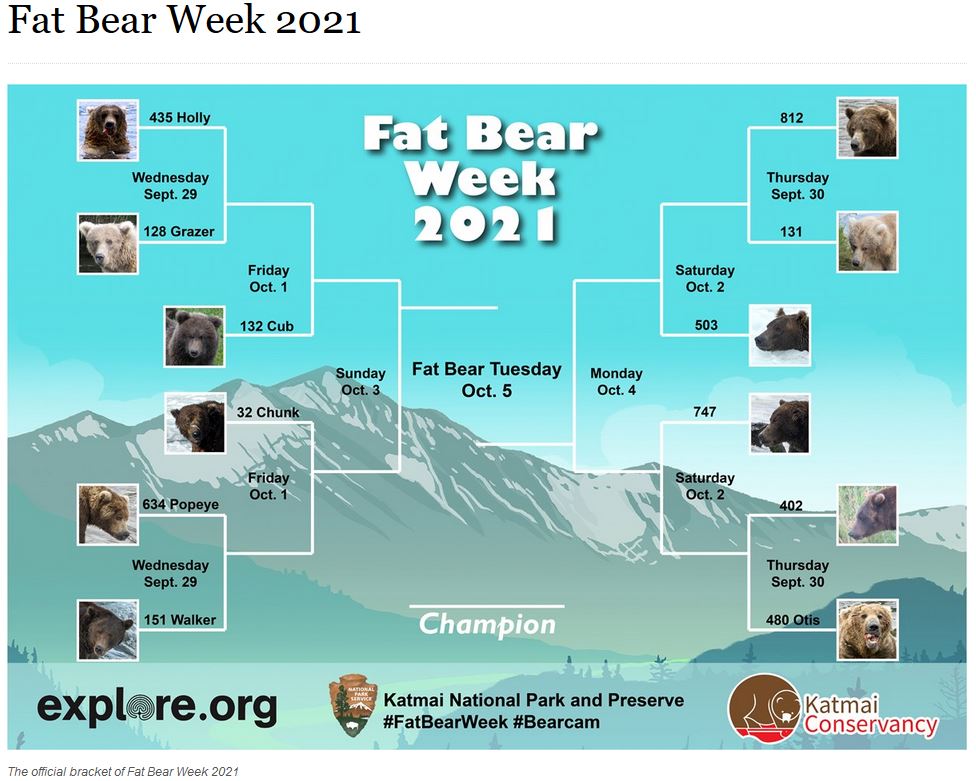Another blogger in the oil field: Mike Shelman, OilyStuff.com. Check him out.
Another blogger in the oil field: Mike Shelman, OilyStuff.com. Check him out.
Katmai National Park on the Alaska Peninsula is the most remote of our national parks, accessible only by boat or plane. It is also prime habitat for bears.
Fat Bear Week is September 29 through Tuesday, October 5. The bears in Katmai are fishing for salmon to fatten up for the winter, and this week the are at their most rotund. Rangers create a bracket pitting indivudual bears against each other for the honor of being named champion Fat Bear, and the public then votes. Last year’s winner was the bear identified as 747, weighing in at 1400 pounds. You can see the contestants and vote here: https://explore.org/fat-bear-week. Here is the bracket (click to enlarge):
You can see the contestants and vote here: https://explore.org/fat-bear-week. Here is the bracket (click to enlarge):

You can get before-and-after photos of the contestants, along with their biographies, here. You can also watch live cams of bears feasting on Katmai’s website, here.
Every once in a while I like to write about something other than oil and gas. I got these interesting facts about eggs from a friend.
Today is the birthday of Benoit Mandelbrot (b 11-20-1924, d 10-14-2010), a mathematician and discoverer of the Mandelbrot set and studied fractal geometry. He was Sterling Professor of Mathematical Science at Yale University, the oldest professor in Yale’s history to receive tenure. Below is an image of the Mandelbrot set. You can go here to view an animation of the set.
From The Hill:
At the rally in Arizona on Monday afternoon, Trump had said he could easily out-fundraise Democratic presidential nominee Joe Biden if he just reached out to oil and Wall Street executives.
“Don’t forget, I’m not bad at that stuff anyway, and I’m president. So I call some guy, the head of Exxon. I call the head of Exxon. I don’t know,” Trump said before playing out a conversation.
From Democracy in America by Alexis de Tocqueville, 1835-1840:
“Political parties in the United States, like political parties everywhere, feel a need to rally around an individual in order to communicate ore effectively with the masses. Thus they generally use the name of the presidential candidate as a symbol: they make him the personification of their theories. Hence the parties have a great interest in winning presidential elections, not so much in order to secure the president’s aid in achieving the triumph of their doctrines as to demonstrate by electing him that those doctrines enjoy the support of the majority.
“Long before the appointed date arrives, the election becomes everyone’s major, not to say sole, preoccupation. The ardor of the various factions intensifies, and whatever artificial passions the imagination can create in a happy and tranquil country make their presence felt.
Last night I watched the presidential debate. This morning I watched the Texas Supreme Court oral argument in State of Texas v. Harris County Clerk Chris Hollins, in which the Texas Attorney General is seeking to enjoin the Harris County Clerk from mailing out applications to vote by mail to all voters in Harris County.
Webster’s defines argument as “a coherent series of reasons, statements, or facts intended to support or establish a point of view; a form of rhetorical expression intended to convince or persuade.”
Webster’s defines debate as “a regulated discussion of a proposition between two matched sides; a contention by words or arguments.”
I have been reading Stephen Harrigan’s history of Texas, Big Wonderful Thing. Great read. I just finished Harrigan’s discussion of the period of Reconstruction in Texas after the Civil War. Two things struck me: first, in the Black Lives Matter era, how we are all being drawn into re-examining our country’s history of discrimination against African Americans; and second, how divided Texas was, both before and after the Civil War, on the issues of slavery and race relations.
After Lincoln’s assassination, his successor Andrew Johnson appointed Andrew Jackson Hamilton as provisional governor of Texas. Hamilton was a former Texas Congressman who opposed secession and escaped Texas during the war. A delegation was then elected in 1866 to write a new Texas constitution. The delegates refused to ratify the 13th Amendment and wrote into the constitution that Blacks would not be allowed to vote, hold office, or serve on juries. Texas voters ratified the constitution in June 1866 and elected a new governor, James Throckmorton, who fought for the South in the war. The newly elected legislature then passed laws known as “black codes” further limiting rights of African Americans. For example, a law required that all Black household servants “shall at all hours of the day or night, and on all days of the week, promptly answer all calls … to be especially civil and polite to their employer, his family and guests.” Continue reading →
What a month.
We are all under the illusion – especially in the West – that we have some control over our lives. COVID-19 has reminded us to the contrary. It is humbling. We can’t see into the future, but what we can see does not look good.
We are asked to stay home, to practice social distancing, to halt commerce and tank the economy. All to prevent something that seems (until recently at least) distant and contingent. We are learning that the only way to prevent the spread of this virus is to act preemptively, before it has attacked. This goes against our instinct as humans. Social distancing has reminded us that we are social animals, that we crave human contact. Conference calls and video conferencing are a poor substitute.
I highly recommend a podcast sponsored by Texas Monthly, Boomtown. It’s a series about the history of the Permian Basin and the people who live and work there in the recent boom. Its host is Christian Wallace, who grew up in Andrews. You’ll get to meet his grandmother, who still lives there – quite a lady. You can download it on Apple Podcasts.